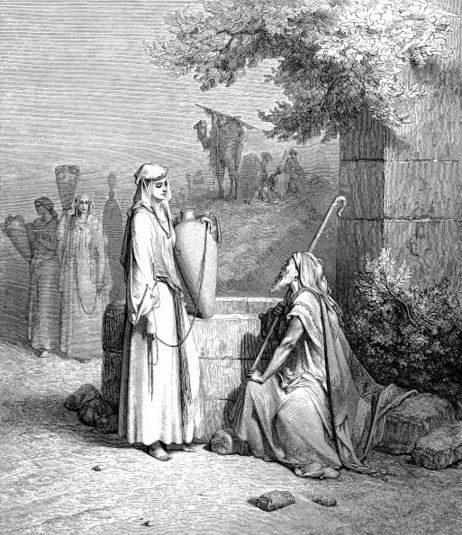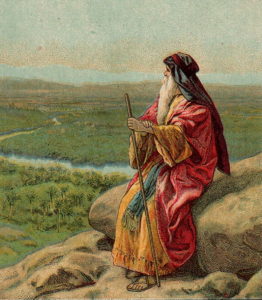
‘Eliezer and Rebekah’ by Gustav Doré
In this week’s parasha, Lech Lecha, we are introduced to Abraham’s loyal servant, Eliezer (Genesis 15:2). Eliezer was a righteous man and wanted nothing more than to be a full-fledged part of Israel. He hoped to marry into Abraham’s family, too, but because he was a Canaanite, and the Canaanites were deemed cursed, it was not possible. Nonetheless, the Arizal (Sha’ar haPesukim on Chayei Sarah) explains that in his future life, Eliezer reincarnated in none other than Caleb, the righteous spy and leader from the Tribe of Judah. In fact, the Arizal explains that this is why Caleb went to visit the Cave of the Patriarchs in Hebron at the start of his spy mission (Sotah 34b). He specifically wanted to pray at the grave of his former master, Abraham, and hoped that just as Abraham had helped him in his past life, he would assist him again in the difficult journey he was on.
Interestingly, the minor Talmudic tractate Derekh Eretz Zuta actually states that Eliezer was one of nine immortal people who never died. These special people merited to enter the Garden of Eden alive and well. As a quick aside, Derekh Eretz Zuta is a fascinating tractate that reads like Pirkei Avot, with maxims from the Sages on ethics, morals, and life advice. It begins with the following statement:
The ways of a scholar are that he is meek, humble, alert, fulfilled, modest, and beloved by all. He is humble to the members of his household, sin-fearing, and judges people according to their deeds. He says “I have no desire for all the things of this world because this world is not for me.” He sits and studies, dusting his cloak at the feet of the scholars. In him no one sees any evil. He questions according to the subject-matter and answers to the point.
The last three verses in the first chapter tell us about some of the greatest figures in Jewish history. First the tractate points out (with citations to prove it) that God forged a covenant with seven people in Tanakh: Abraham, Isaac, Jacob, Moses, Aaron, Pinchas, and David. One might notice that these are nearly the same as the Seven Shepherds made popular by the Sukkot ushpizin, with the exception being Pinchas in place of Joseph. The truth is that Pinchas and Joseph are spiritually linked, with Pinchas containing a spark of Joseph. Kol HaTor (Ch. 2) even states that Pinchas was the potential “Mashiach ben Yosef” of his generation. There is mathematical proof to this, too, with “Pinchas” (פינחס) being 208, exactly like “Ben Yosef” (בן יוסף).
We are then told that seven people were so righteous and holy that their bodies never decomposed: Abraham, Isaac, Jacob, Moses, Aaron, Miriam, and Amram. Some also add David to this list. Finally, the chapter ends with nine people who merited to enter the heavenly Garden of Eden alive: Enoch, Eliyahu, Mashiach, Eliezer, King Hiram, Eved-Melekh the Cushite, Yaavetz “the son of Rabbi Yehuda HaNasi”, Batya the daughter of Pharaoh, and Serach bat Asher. Some add a tenth person to the list: Rabbi Yehoshua ben Levi. What was so great about these individuals? Continue reading

